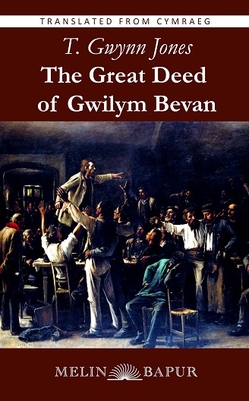Your basket is currently empty!

Gwilym Bevan: the Great Welsh Agnostic Novel
This is a blog post from our guest writer, Dr. Adam Pearce. It was featured in the May issue of Welsh Histories Magazine.
The Great Deed of Gwilym Bevan – A Review by Dr. Adam Pearce
I have argued elsewhere that early novels in Welsh have been systematically underrated by the academic community in Wales, and I can think of no illustration of this argument than T. Gwynn Jones’s Gorchest Gwilym Bevan, which we at Melin Bapur are proud to be publishing this week in English for the first time (The Great Deed of Gwilym Bevan).
T. Gwynn Jones has been, one senses, undergoing a bit of a revival in recent years. The ridiculous furore over the motto of the Llangollen International Eisteddfod seems to have done him no harm; and we have seen a wonderful biography by Alan Llwyd, Byd Gwynn, as well as a first publication in many long years of his poetry in the Cyfres y Cewri series. It is fitting therefore that—as Alan Llwyd calls for in Byd Gwynn—we revaluate his prose, and Gorchest Gwilym Bevan, is as good a place as any to take a first look at the work of a man who’s contribution in this field has, in my view, been grossly underappreciated.
If most people are familiar with 19th century Welsh prose at all then it is with Daniel Owen. Readers expecting something similar will quickly realise they are reading a very different sort of tale here: the novel’s opening scene sees the eponymous hero attempting to end his own life by drowning in the river Thames. It is difficult to comprehend today just how bold a move this was in 1899, in a culture extremely averse to anything uncomfortable or potentially improper.
Saved and convinced to take another shot at life by a beautiful woman, Gwilym makes his way back to Wales and finds work in the quarry. However, all is not well in the quarry, and soon enough the men are striking for better conditions. There follows a sequence of exciting twists and turns with another, a housefire that kills a character, a riot, and a standoff at gunpoint, before a radical and somewhat unexpected ending.
At its core then, Gorchest Gwilym Bevan is a novel about social unrest: hardly unique territory for a Welsh novel, but actually this novel may well be the very first example from Wales in either language: it is decades older than Traed mewn Cyffion and Chwalfa, the two great novels about the Great Strike in the Penrhyn quarry, which hadn’t actually happened yet at the time Gorchest Gwilym Bevan was written. The novel is one of the earliest literary expressions of radical politics in Welsh: Here is a young writer determined to use his art as social and political activism. To quote Alan Llwyd, it is a ‘socialist’ novel, and it certainly wears its political heart on its sleeve. The novel is full of powerful expressions of radicalism that might almost be political slogans, such as Arthur’s cry in Chapter X:
I would rather die without a penny to my name than think that what I owned had been earned through ruining the lives of my fellow man!
However, it would be a mistake to assume that this novel is a black-and-white morality tale about the good workers and their evil masters. For a start, the tables are turned several times over the course of the novel: whilst he is indifferent to his workers’ concerns, the Quarry owner Mr. Morrus is a character with various admirable qualities, and by the end of the novel appears to have fully realised the folly of his actions and indeed has suffered more than anyone else as a result of them. The workers, too, honest as they may be, are shown to be capable of brutality and savagery, and are quick to abandon their leader and make him the scapegoat for their grievances. In fact, rather than a theme of social solidarity, time and time again we see characters who are misunderstood by their peers and persecuted by them, whatever their class. Although undoubtedly radical, this is not so much a novel about class warfare, but rather about the struggle of the individual against society.
Besides his politics, a number of other elements from Gwynn’s own life and background make their way into the novel, and although the narrative is mainly in the third person Gwynn’s own voice can clearly be heard throughout the novel. We see his solidarity with suffering and his political radicalism most obviously; but more mundanely we see things like his contempt for poor journalistic standards and his ambivalence towards University education. Welsh cultural prejudice against novels comes under fire too. Gwynn’s own cosmopolitanism is front and centre, as are his love for learning (actual learning, as opposed to mere education), and his contempt for those who deem anything beyond their own knowledge and understanding, particularly anything foreign, to be dangerous.
As suggested by its opening scene, the novel also reflects Gwynn’s experience of depression. Throughout his life Gwynn was plagued by periods of anxiety, depression, pessimism and intense self-doubt, and whilst Gwilym Bevan cannot be considered a work of deep psychological complexity, the frank depictions of suicide and despair that it contains are, as far as I know, completely without precedent in Welsh.
This analysis so far may give the impression that the novel is rather dry and serious, but nothing could be further from the truth. Gwynn’s playful wit and eye for comedic dialogue are never far away, particularly in the first half of the novel. A wonderful example is this magnificent comeback:
“I was thinking that at some point he must have been associating with cultured and sophisticated people, even if he doesn’t now.”
“It’s quite possible,” said Olwen sternly, “after all, I don’t think he ever went to university.”
These humorous elements are yet another element which Gwynn weaves into his whole in a naturalistic way, and though they peter out as the novel rushes towards its increasingly chaotic climax, they help mitigate against some of the more serious elements and prevent the more sentimental parts of the novel from veering into kitsch.
One additional aspect of Gwynn’s personal biography demands mention: his religious agnosticism. Gwynn’s relationship with religion oscillated constantly throughout most of his adult life, back and forth from outright atheism through agnosticism to periods of fairly steady religious attendance, and even flirtations with Catholicism. Gwynn stops short of making his hero an outright atheist; however, Gwilym is clearly plagued by doubts, and repeatedly asks how God can permit suffering, questions the narrative leaves deliberately unanswered. There are parallels to Christ in Gwilym’s character arc: he spends time in the wilderness, becomes a leader of men, is betrayed by them, and finally sacrifices himself for the wellbeing of those around him. Throughout the novel it is always Gwilym’s behaviour which is the most obviously Christian—indeed, he is sometimes saintly to the point of stretching credibility. In the introduction to the new Welsh edition I called this novel ‘the Great Welsh Agnostic novel’, and it is an apt description, for clearly these elements are of equal or even greater importance to the novel’s political radicalism, and it is in this respect perhaps that the novel most obviously diverges from contemporary expectations of the novel in Welsh.
The novel isn’t without it’s flaws of course. Gwynn is not above employing the stereotypes and conventions of the age, such as stock characters, and both of the go-to elements Victorian novelists employed to stimulate interest: improbable coincidences and mysteries to be revealed, arguably neither of which were needed on this occasion: the story is more than strong enough to stand without them. The author is also happy to dip into sentimentality on occasion, in particular with the character Gwen bach, where any pathos the author intended to evoke is drowned in sheer schmaltz. These elements are about the only parts of the novel that get a mention in the few occasions the novel is discussed in the academic literature: criticisms that can be applied to dozens of authors of the period, and surely do not justify the continued neglect of such a wonderful, and above all exciting novel.
The above elements notwithstanding however, for the most part The Great Deed of Gwilym Bevan is a novel which feels remarkably fresh for its age, and one suspects that if anything it will hold more appeal to audiences in 2024 than it did in 1899. The way Gwynn successfully weaves the political and philosophical elements into the narrative without them feeling shoehorned marks him out as a master of this kind of writing, and one can’t help but feel that the Welsh novel in the twentieth century might have taken a very different course—and a better one—had this, and Gwynn’s other novels, received more attention than they did.
The Great Deed of Gwilym Bevan (translated by Adam Pearce) is available from www.melinbapur.cymru and priced at £9.99 + P&P. Bricks & mortar stores interested in stocking Melin Bapur’s books are requested to contact the publisher at [email protected].
Guest Writer – Dr. Adam Pearce
Dr. Adam Pearce is a literary translator and the editor of Melin Bapur Books. He has a PhD from Bangor University in the translation of Victorian Welsh literature.
More from Welsh Histories
Welsh Histories is a Welsh history celebrating platform which looks to promote all aspects of Welsh history. Though we focus predominantly on native Welsh history, we do also share the non-native aspects from time to time. You can follow us on Facebook; Instagram or Twitter for more. A reader? We also have our very own Welsh Histories Shop where we sell our Welsh Histories Magazine. Diolch yn fawr iawn and keep enjoying Welsh Histories.

